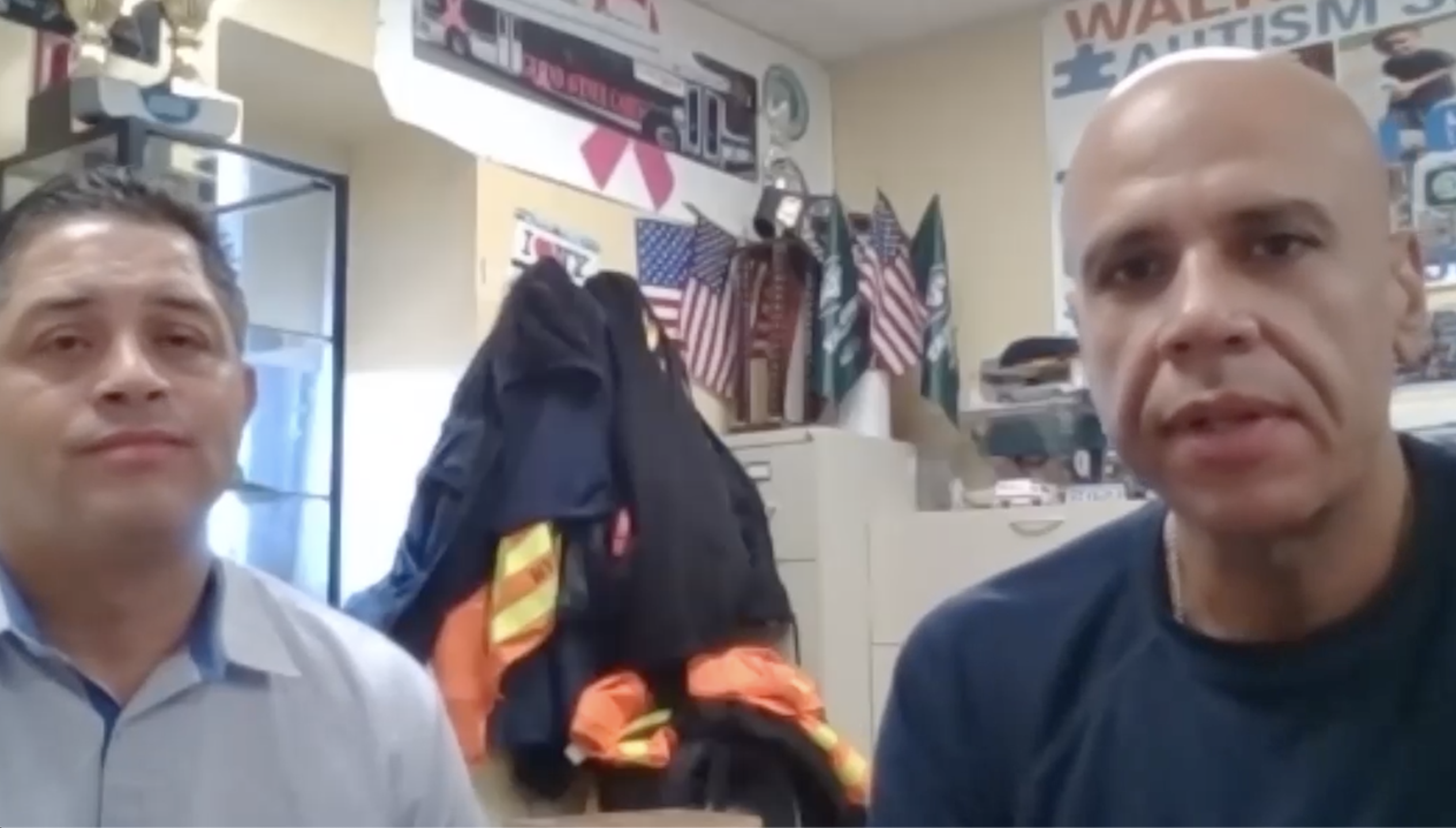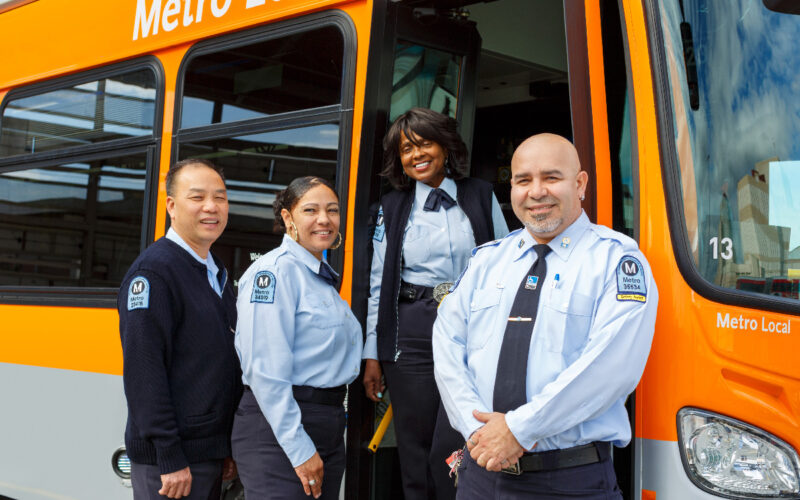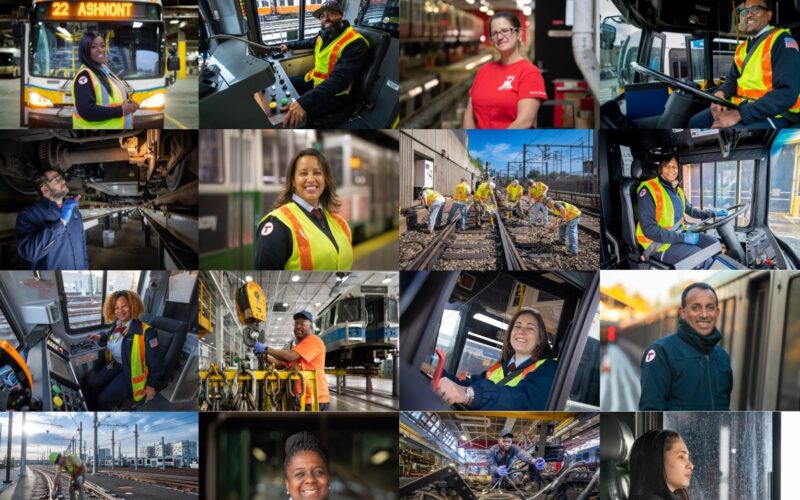
Carlos Saliva and Moises Del Rio at the Grand Avenue Depot in Williamsburg.
We talked to bus operators at Brooklyn’s Grand Avenue Depot about their role in the city’s fight against COVID-19.
Every morning at the start of his shift, Kenneth Warders wipes down all the surfaces in the cab of his bus. The steering wheel, the cradle that his radio sits in, everything. This is something he has always done, but it has taken on greater importance now that Warders is operating a bus on the front lines of New York City’s coronavirus outbreak.
Since March 23, most riders enter through the bus’s back door without paying a fare, a New York City Transit policy to put protective physical distance between operators and riders. Warders was given a mask to wear, but it’s a disposable mask that he says he’s supposed to reuse indefinitely. Operators and union leaders are calling for more protection. (Since our interview, the MTA has announced further steps to replenish the supply of masks and gloves.)
As of March 31, eight MTA workers in New York have died from coronavirus, and as of April 3, 774 have confirmed diagnoses, and several thousand are out sick or quarantined. At the Grand Avenue depot, 18 of Warders’ colleagues have tested positive and 50 are currently quarantined.
Bus operators enable essential mobility for hundreds of thousands of workers providing medical care, food, and other critical needs in New York during the COVID-19 emergency. Keeping bus operators safe keeps the whole city safe.
Operators are worried they don’t have the protective equipment they need. After initially following faulty federal guidance and banning the use of masks by bus operators, NYCT allowed all workers to use masks on March 9. On Friday, March 27, the agency announced it would begin distributing face masks to workers, with new supplies each week.
Bus operators say the masks need to be replenished more often. Pan Chan, who operates a bus between Downtown Brooklyn and Ridgewood, Queens, explained that the day after he received his first mask, he reported to duty expecting to receive a new one. Instead he was outraged when he was told, “No Mr. Chan, that was your mask.”
Chan is particularly concerned because there are still times when he needs to be in close physical proximity with passengers. For instance, when a passenger who uses a wheelchair boards, which is only possible through the front door, he assists with securing the chair.
Operators we spoke with are satisfied with measures taken to keep physical distance between operators and passengers through the use of boarding through the rear door and suspension of fare collection. However, they’re concerned that riders are still facing unsafe crowded conditions at particular stops and on particular routes. While bus ridership has dropped 70% during the crisis, on the route Warders drives between Williamsburg Brooklyn and Rego Park Queens in the morning “you still get some standing loads on the back of the bus, where people are definitely within inches of each other.”
Grand Avenue Depot Vice Chair Moises Del Rio says New York City Transit can do more to reallocate service to routes that are still in demand. There are some routes operating with very few passengers while others continue to be crowded.
“The B47 runs from Woodhull Hospital all the way to Kings Plaza…and on the [current] schedule, the headway is like 20 minutes, so it’s a bigger crowd now waiting for the bus,” he said. “They need somebody from management to come and control the service. If you’re not picking up passengers on these couple of lines, cut ‘em off and put that service on the heavier lines and make it happen.”
Finding a bathroom is always an issue for bus operators in NYC and is even worse now, making the job more difficult and limiting their opportunities to wash their hands. Chan says he used to rely on diners and laundromats that are now closed or won’t let him enter because of safety precautions. He’s limiting the amount of water he drinks because he needs to wait until he gets back to the depot, which can take hours, to use the bathroom.
Chan is concerned that some of his riders may be making trips that aren’t essential and urged New Yorkers who can stay home to do so.
“People need to understand how serious this is right now,” he said. “They need to understand that everybody is sacrificing. Even me, [I’m] sacrificing. Because I’m putting my family at risk. I go home to my mom who’s in her late ’70s. My dad who is in his early ’80s. With both in serious health conditions already. I have four kids. A wife. I just moved my in-laws over. I’m trying to serve the public, at the same time I know that every day, I don’t know what I could be bringing home. I could try to be washing my hands constantly. There’s always a possibility that somewhere along the line, something goes wrong and I bring something home to my family.”
 New Drug Testing Rule from USDOT Could Help Alleviate the Bus Operator Crisis
New Drug Testing Rule from USDOT Could Help Alleviate the Bus Operator Crisis
New drug testing rules from the USDOT could make it easier for transit agencies to recruit more operators - but only if they implement the rule.
Read More MBTA Partners with Union to Reach Historic Wage Agreement
MBTA Partners with Union to Reach Historic Wage Agreement
The Massachusetts Bay Transportation Authority and its union, Carmen’s Local 589, reached a historic agreement to increase bus operators' starting wages from $22.21 to $30 an hour, shifting MBTA operators from the lowest paid to the highest paid in the transportation industry.
Read More